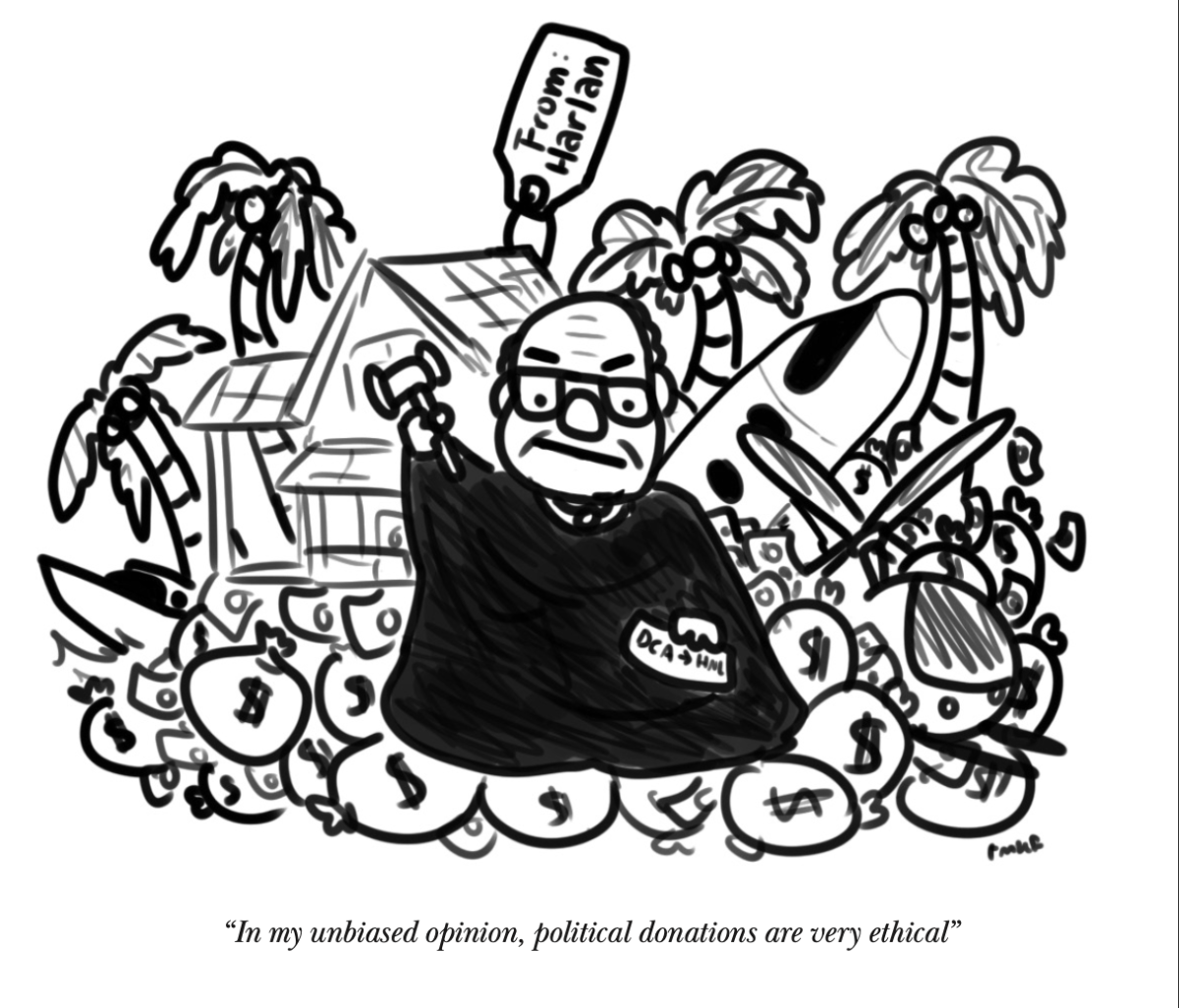When we were little, we viewed the nine seats of the Supreme Court as sacred — so powerful and just, that their word was law. But as each of us grew older, we started to realize the negative side of the superfluous power their pens seemed to hold. These justices were humans, so rooted in emotion and so easily influenced by greed.
In the past year, ProPublica, a non-profit news source, has done multiple research pieces on the gifts that both Justice Clarence Thomas and Justice Samuel Alito have accepted from billionaires. Justice Thomas failed to report the luxury trips he took with Harlan Crow, a Texas billionaire who has long supported conservative organizations, in his annual financial disclosure form. This form is for transparency and accountability of public servants. According to a recent ProPublic investigation, Thomas received a combined total of 38 trips, including 26 private jet flights, VIP access to sports events, and luxury accommodations.
As for Justice Alito, in 2008, he failed to disclose his acceptance of an Alaska fishing trip provided by billionaire Paul Singer. To make matters worse, Singer was directly involved in a case in which Alito failed to recuse himself from. This poses a conflict of interests and threatens to undermine the integrity of the Supreme Court.
Many are quick to assume that the acceptance of gifts is unethical and must be illegal. The first part, yes. The second? Not so much.
There is no code of ethics for the Supreme Court, a group of nine people who make some of the most important decisions in our country and have lifetime appointments in the Court. The closest thing to regulation of the Supreme Court is the Ethics in Government Act. This federal law dictates that officials must disclose their financial dealings.
We as Palo Alto High School students are held to the same standards of ethical behavior through the student handbook that we agreed to follow (although it’s fair to say that we really didn’t have much of a choice) at the beginning of the year. Throughout the 121 pages, this booklet details the scholarly expectations for both parents and students to uphold. If students with comparatively no power over Supreme Court justices must follow strict protocol, why shouldn’t they?
The Paly academic honesty section alone spans multiple pages, going in depth about what is and is not allowed for students, aiming to maintain the integrity of the Palo Alto Unified School District. How come rules like these don’t translate into the highest court of the land?
It’s imperative that we look at this corruption problem from a macro-angle. These justices recently ruled on, and overturned, both affirmative action and the federal right to abortion. Gift-giving still has a profound psychological impact on the recipients, even if they aren’t a bribe. These gifts create a conflict of interest.
Even if the gifts have not affected their rulings, the perception of justices lying on their annual financial disclosure form will steadily erode the credibility of the court in the eyes of the American public.
We have long prided ourselves as a country with checks and balances, a country that prizes equal representation and democracy, a country in which all men, no matter their position of power, are indeed created equal.
The alleged bribing of Supreme Court justices, those who preside over the highest court in our nation, doesn’t help refute that perception.
Now, there is a debate about whether these gifts fall under the realm of “gifts of travel,” which are required to be disclosed, or “personal hospitality,” which does not have to be reported. According to the Brennan Center for Justice, personal hospitality must come out of the individual’s own pocket, be for non-business purposes, and cannot include transportation. Regardless of whether justices are legally bound to report these “perks,” the acceptance of lavish and expensive gifts by those who preside over cases has profound effects nationwide.
When cases of these donors come before the court in the future, what is stopping the justices from acting unethically due to their relationship with donors?
What’s even more surprising surrounding the scarce number of laws regulating corruption in the federal government is that rank-and-file federal civil servants are confined by stricter laws than justices who exert enormous influence.
According to the Department of Justice, federal employees can only receive gifts worth $20 or less per occasion and a maximum of $50 per calendar year from one donor. But Supreme Court justices accepting gifts and luxury gifts from billionaires is reasonable?
To tackle this issue, Congress will have to legislate regulations and enforce ethical rules on the justices if justices cannot control themselves.
However, some justices believe that this is not permissible by the Constitution. Justice Alito has said outright to The Hill: “I know this is a controversial view, but I’m willing to say it: No provision in the Constitution gives [Congress] the authority to regulate the Supreme Court — period.”
In a time of polarization and argument, the lack of ethics exhibited by the highest Court is arrogant and repulsive. This “gift-giving” creates the perception that the justices on the Supreme Court can be bought, further undermining the already fraying integrity and legitimacy of government. It also sets a bad example for how others might behave in the future. What are we being trained for in school, after all, if adults in important jobs don’t have to follow any guidelines? Our justices need to take responsibility, whether on their own will or through legislative enforcement.
